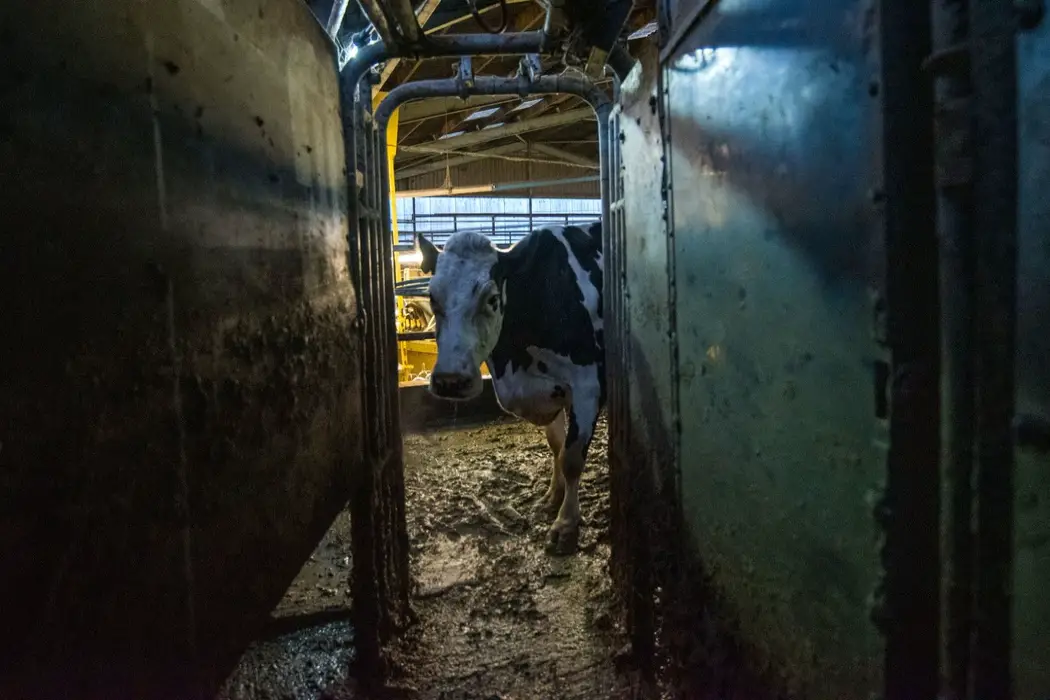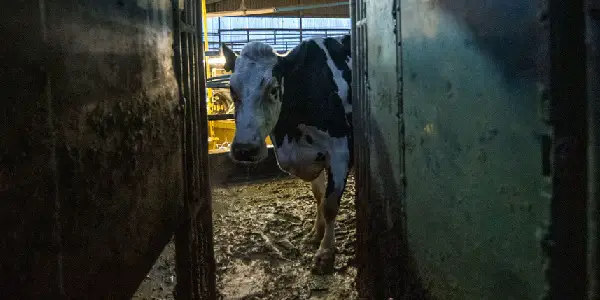COW: Andrea Arnold’s Poignant Documentary On The Mother Behind Your Carton Of Milk

Rachael Sampson is a Yorkshire screenwriter and film critic. She…
MUBI savvy cinephiles and underground indie enthusiasts will be very familiar with the nuanced work of Andrea Arnold. Her oeuvre specialises in magnifying the marginalised; honing-in on what capitalist, hierarchical society deems as irrelevant or ugly – only to reveal its true beauty underneath. Arnold’s new observational documentary on cattle might seem like an outlier within her catalogue (with its non-human protagonist), however it is no exception to her number 1 rule: empathy.
It is very easy to make a predetermined judgment of her latest feature, instinctually synonymising it with the likes of Cowspiracy and Dominion, however, Arnold does not present conspiracy with secret footage or an overbearing agenda narrated to the audience. She simply presents Cow: Luma’s life as she exists on a dairy farm, fulfilling human demand for her milk.
Prior to Arnold’s 2021 livestock study, she gave us Dog, Wasp and Fish (Tank), but now… it’s the year of the Cow.
Mother’s Milk
A maternal thread runs through Arnold’s body of work, and as living beings, we often find familial comfort in motherly, feminist spaces – which is what we feel when we first see Luma; she enters our lives as her calf enters the world. The second we see movement and recognise that the birth was a success, we relax. She licks her calf clean and the calf then suckles. All is well.

Innate empathy clouds our judgment as Luma’s calf is soon torn from her by those who aided the birth. She then begins to moo and cry as her calf disappears from sight, heavily reminiscent of the harrowing footage of orcas at Sea World in Blackfish – shaking and wailing as they’re ripped away from their young. A universally painful experience.
For the next 4 years, we witness Luma merely exist as she is milked, assaulted, and impregnated in an agonising cycle, only for her young to be torn away once more. The details of her existence are truly difficult to watch and comprehend, but the toughest observation of all is Luma’s disintegration, as told by Luma herself – through her big black eyes.
Window to the Soul
Arnold stated that her aim for this project was to show a non-human consciousness, in a bid to then feel that consciousness. In the editing room, she kept saying over and over: “I’m seeing you, Luma. Don’t worry Luma, we see you.”
As the language of both director and subject is understood, it’s almost impossible to resist falling down the rabbit hole as we get lost in Luma’s eyes; her rage when other calves are removed from their mothers, and her numb vacancy when she’s hooked up to the milking carousel – being drained of her young’s nourishment as she slowly spins around.
Her depression is only heightened with BBC Radio 1 echoing around the farm. Billie Eilish’s “Lovely” (with Khalid) turns haunting as Eilish softly sings the words “I hope someday I’ll make it out of here, even if it takes all night or a hundred years, need a place to hide, but I can’t find one near.” Luma’s silence speaks volumes.
Arnold’s Angle
Any type of film that provides a voice for voiceless animals always conjures criticism from meat and dairy lovers, suggesting footage has been manipulated or that facts are incorrect. They are also met with blissful ignorance and a refusal to watch, as consumers are unable to accept that their taste for milk is the reason why these animals suffer.

It’s difficult to poke holes in this narrative because even though Arnold’s angle is overtly compassionate and warm, she remains passive and does not intervene with the cows or farmhands – achieving total authenticity.
Arnold has no overbearing agenda. The repercussions of her footage simply reflect the clear inhumanity and callousness of the industry. There’s so much noise around the dairy debate – the humans have already shared their thoughts, but what about the animals themselves? It is now the cow’s turn to tell us how they feel.
Luma’s story transcends her species as it speaks to mothers, women, and children who become a product of unfortunate circumstances – a reoccurring notion within all of Arnold’s films. The female energy in and around Cow intensifies its power, as it taps into something we women can wholeheartedly commiserate. Not only is her story literal, but it is also a metaphor for oppression and the shackles of womanhood.
Conclusion: Long Live Luma
Cow is tender, respectful, and incredibly visceral. It has heart, soul and oozes empathy. On a personal note, I have not cried like that in a long time. The emotion it triggered in me was overwhelming, yet I was not embarrassed by my tears as they were indisputably warranted.
Arnold’s poignant documentary is doused in transparency and truth – the hardest pill to swallow. She leaves us watching Luma’s daughter travel down a winding country road, inferring that she is heading towards an existence identical to her mother’s.
Every single cow that was filmed at Park Farm, as well as the rest in the United Kingdom (and world), is our Luma, at different stages of their own life sentence – something to remember next time you reach for that carton of milk… Is it really worth it?
A 94-minute film about a cow with little to no dialogue, people or pre-planned narrative structure didn’t initially strike me as a life-changing experience, but here we are.
What are your thoughts on Andrea Arnold’s new documentary? Share your thoughts and comments below!
Watch Cow
Does content like this matter to you?
Become a Member and support film journalism. Unlock access to all of Film Inquiry`s great articles. Join a community of like-minded readers who are passionate about cinema - get access to our private members Network, give back to independent filmmakers, and more.
Rachael Sampson is a Yorkshire screenwriter and film critic. She often finds herself daydreaming about Andrea Arnold's filmography or crying over The Graduate.













